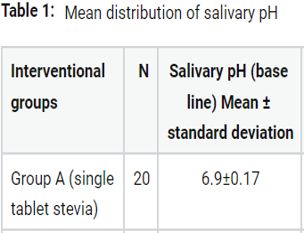Abstract
Stevia is a natural sweetener which is used as a sugar substitute. It has been suggested that Stevia may be anti-cariogenic. However, there is limited research in this regard. Currently, Stevia rebaudiana, a plant is considered to be a suitable replacement of sugar which is healthy and has much fewer side effects than other sweeteners. To assess the salivary pH and streptococcus mutans growth among the participants after mouth rinsing with water containing natural sweetener. This double-blinded parallel clinical trial was done among forty female participants aged 22-25 years. Study participants were selected and randomly allocated by lottery method as two different groups as group A, and B. Microbial growth and pH of the saliva was assessed twice, once before rising with stevia solution and at 20 minutes after rinsing with a sugar solution containing Stevia (single tablet and two tablets) mixed in distilled water. Collected data were analyzed using the paired t-test. It was found from the study that there was an increase in mean salivary pH when compared with the baseline value after rinsing with Stevia. There was an increase in the Streptococcus mutans count after rinsing with Stevia. Increase in streptococcus mutans count was found to be low in Group A than group B. pH value stays in neutral value even after rinsing with a natural sweetener. There is no much difference between Group A and B. Salivary pH after mouth rinsing with Stevia is in a neutral state. It has low Streptococcus mutans growth suggesting that Stevia can also be used as a sugar substitute replacing artificial sugar substitutes.
Full text article
Authors

This work is licensed under a Creative Commons Attribution-NonCommercial-NoDerivatives 4.0 International License.

